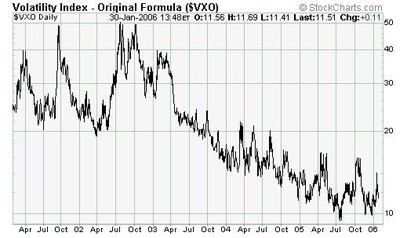| Home | About Us | Resources | Archive | Free Reports | Market Window |
Why Commodity Stocks Are Still SupercheapBy
Tuesday, January 31, 2006
“What’s going to happen with shares of commodity companies?” That’s the big question on my mind while I’m based here in Australia. After all, shares of commodity companies have soared in price. People are finally paying attention to the companies that produce things like gold, copper, lead, and uranium. But in my mind, we aren’t near the top yet in this commodity boom. And shares of commodity companies are still cheap. To get some answers, I spent Saturday with Australian commodity shares analyst Gavin Wendt. It had to be Saturday, because Gavin is an in-demand guy... We were supposed to get together on Friday, but Sky TV called and wanted Gavin on the air for his comments on the latest news from Australia’s BHP, the world’s largest commodities company (and one of the recommendations in my True Wealth newsletter). So Saturday it was. Sitting at an oyster bar just off Circular Quay in Sydney Harbor overlooking the Sydney Opera House, we got down to business... In short, even though commodity shares have run up a great deal, Gavin’s still a commodity bull. Like me, he believes commodities are in something of a “super cycle” now, and that the shares of commodity companies will outperform in the coming years. Gavin and I agreed that even if we’re wrong about commodity prices, we still think that shares of commodity-related companies are cheap and could soar in 2006. Among many reasons we discussed, I’ll share two: First, we think the brokerage firms have been late in raising their commodity price forecasts. They don’t believe we’re in a big commodity bull market. For example, the price of copper is over $2.00 a pound. However, brokerage firms are using less than $1.00 a pound in their long-term assumptions. Yet even based on ridiculously low copper price assumptions, copper-related stocks are cheap... Phelps Dodge, for example (a massive U.S. copper producer) trades at about 10 times Wall Street’s forecast earnings. If the forecast was based on a higher copper price, Phelps Dodge would appear much cheaper. Wall Street’s commodity price forecasts will undoubtedly be revised upward. I don’t need a crystal ball to predict this... the gulf between current commodity prices and the predictions from Wall Street’s economists is ridiculous. It’s so wide that, even if commodity prices fall, the Wall Street commodity predictions will still have to rise. Gavin expects analysts could revise their commodity-price predictions as much as 30% higher. Gavin’s thought sounds extreme at first, until you understand how far off Wall Street’s predictions are, as in the case of copper. Second, Gavin and I agreed that more money is about to flow into commodity ideas in 2006. The big institutions move slowly, as do individual investors. In 2006, both institutions and individuals will finally move some of their money out of your typical stocks and bonds, and into commodity plays. Gavin and I have both been recommending our respective readers have a large position in commodities. I have no particular expertise in commodities, when it comes right down to it. I consider myself a generalist. I come up with a big theme, narrow down the universe of possibilities, and then seek out experts like Gavin, who’ve spent their careers following that tiny universe. After a decade as a commodity stock analyst for an institutional brokerage firm, Gavin felt it was time for a change. He’s now writing his own newsletter, focusing on mining firms that trade in Australia. Gavin knows the CEOs. He goes to the shareholder meetings. He does the in-the-trenches work. If you’re looking for good ideas in small-to-medium sized Australian-traded stocks, you ought to try out Gavin’s letter. (There’s a 30-day money back guarantee offer, so you can try it with no risk. Go to www.fatprophets.com.au) For me, Gavin just confirmed my strong beliefs... that Wall Street has totally missed the boat with its commodity price forecasts, and that individuals AND institutions will finally start to move some money out of stocks and bonds and move it into commodity plays in 2006. Yes the share prices of commodity-related companies have run up... but both Gavin Wendt and I believe that there’s more to come... Good investing, Steve Market NotesA BEAR MARKET IN FEAR
|
Recent Articles
|


